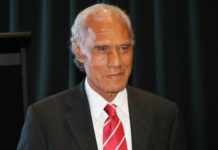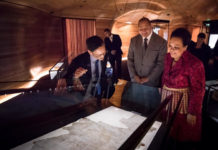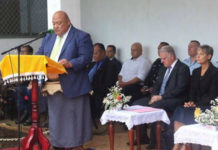Kiliki heni ke lau e ongoongo ni he lea faka-Tonga
Joshua Tu’iono Liava’a, the former New Zealand policeman who was shot in Honolulu on Sunday, was described by his close friends as “courteous, loving, defensive and self-protective.”
Tongan-born Liava’a died in a Honolulu hospital after the shooting.
Samuela Mataele, 18, appeared in court yesterday charged with murder and was due in court again this morning.
Liava’a, who was also known as Josh, had told friends he thought Hawai’i was a safer place for him to live.
Liava’a led a colourful life. He was involved in the push for democracy in Tonga, ran businesses in Sydney and Auckland and was married to one Tongan princess, Mele Siu’ilikutapu and romantically involved with another.
Read more : Joshua Tu’iono Liava’a dies following shooting incident
Liava’a, who was 66 when he died, arrived in Auckland in 2003 from Australia in which time his affair with Princess Pilolevu, daughter of the Tongan king went public.
When the story was reported by the Tongan media the news divided the Tongan community and started a war of words with supporters of the royal family.
He was seen with a bodyguard and said he feared for his life after being tipped off by New Zealand sources that he was being watched by members of the New Zealand and Australian constabularies.
Liava’a, who had been a Detective Sergeant in Auckland, helped set up the New Zealand Tongan Society for the Political Reform in Tonga (NZTSPRT) in 2004. He was appointed president in 2005 and remained president and chairman until Tonga became a democracy in 2010.
In 2006 New Zealand and Australia funded a committee to conduct a survey in Tonga and among Tongans living in Australia and the United States on whether they wanted democracy for Tonga.
In New Zealand Liava’a and the NZTSPRT hosted the committee and were responsible for organising of programmes and venues for the survey, which was led by his former brother-in-law, Prince Tu’ipelehake, Princess Mele Siu’ilikutapu’s brother.
Prince Tu’ipelehake died in an accident in the United States in 2006.
Liava’a, who represented New Zealand in rugby league in 1975, also revealed a multi-million project he planned to negotiate with the government of the Solomon Islands to urge the American administration to fund a project to clean up explosives and sunken ships left over from the Second World War.
Liava’a said these items endangered the lives of Solomon Islanders and countries like America were responsible for them.
He flew to the Solomon Islands to negotiate his plan in 2010.
He stayed with Tahifisi Vehikite, a Tongan who was then in the Solomon Islands as manager of the Kramer Group (Solomon Islands) now Kramer Ausenco (Solomon Islands) Ltd.
“I dropped him off to the then Solomon Police commissioner office who was a New Zealander,” Vehikite told Kaniva News.
“I knew he was very close with Josh. I think they were in the New Zealand police together.
“Josh told me he talked to the Police commissioner as part of his attempt to approach the Solomon authorities.”
Vehikite said he talked with Josh about the project and how he planned to seek approval from the Solomon’s authority.
David Latapu, with whom Liava’a stayed several times before he left for Hawai’i in 2013, said part of his travel to Hawai’i was to see if there was a chance to realise the Solomons project.
“Josh was the kind of person who would never give up,” Latapu said.
“He always talked about the multi-million project he planned for the Solomon Islands.”
“He went to Hawai’i to see if there was opportunity for him and his wife Victoria, but I knew the project for the Solomons was on the agenda.”
Latapu revealed that Josh said he felt Australia and the United States were not safe.
He quoted Liava’a as saying that New Zealand was safer for him than Australia and Hawai’I the safest place if he went to the United States.
“I was shocked when I heard about his death, as it brings many memories about him,” Latapu said emotionally.
“He was such a gracious and courteous person and I am struggling to understand why he ended up in such a tragedy.”
Although Liava’a was in his 60s he was a fitness fanatic. He used to instruct friends how to safeguard themselves by showing basic self-defensive tactics he said he learnt while he was in the police.
“Josh used to come and exercise with me here using my weight lifting stuff and he could lift up to 100kg,” Sosefo Holani one of Liava’a’s close friends, said.
“He can still do push-up exercise even with just his right hand only or left hand.”
Holani said he was shocked to hear about the way Liava’a died because he was physically and psychologically fit.
“I prayed for his soul when I heard about his death,” Holani said..
Liava’a married Levaai Nancy Wolfram in 1971 after his wedding to Princess Mele Siu’ilikutapu was forcibly annulled in 1970.
In 1986 they arrived in Tonga intending to establish squash pumpkin farming for the Japanese market.
The government did not support the business and according to Liava’a they financially assisted Prince Mailefihi, another brother of his first wife, Princess Mele Siuilikutapu.
The prince successfully ran another squash export company, forcing Liava’a and his wife to leave the country penniless after they had invested more than half a million pa’anga in their business.
At the time the New Zealand Herald reported: “He said the Government waited until it saw how successful they were and then gave one of his growers, a prince, and senior Government officials $1 million to run their own squash export business.”
The squash pumpkin farms were extremely successful and local growers could be seen purchasing vehicles with cash after in squash harvesting.
Liava’a believed the Tongan government should compensate him because he had helped the kingdom’s economy.
After he wrote to Tongan authorities about the issue, they told New Zealand’s diplomatic protection squad they feared Liava’a intended to kill King Taufa’ahau Tupou IV when he attended the Sydney Olympics in 2000.
He later met with the then Tongan Police commander, Sinilau Kolokihakaufisi, and Tongan authorities declared he was not a threat to the king.
Following the news of his death Tongans took to Facebook to thank him for the help he had given to their families in immigration and business matters, but mostly for pushing the Labour Party government under David Lange to allow a visa free entry in 1986.
Liava’a and others in New Zealand hired an aeroplane and it was announced in Tonga at the time that anybody with a passport and an airfare could board the plane and go to New Zealand.
Many Tongans left the kingdom for New Zealand through this opportunity and most of them are now residents and citizens of New Zealand.
One man thanked Liava’a on the Kaniva Pacific Facebook page for the opportunity he and his children and grandchildren had as New Zealand residents. He said he was shocked to hear of his death and said his family still owed him much.
Liava’a was involved in a number of businesses in Auckland, including a security guard company, a night club, travel agency and the importation of Tongan food for sale to the Tongan community in the 1980s.
The main points
- Close friends of Joshua Tu’iono Liava’a, the former New Zealand policeman who has died in Honolulu after a shooting, was described on Sunday as ‘courteous, loving, defensive and self-protective’.
- Samuela Mataele, 18, appeared in court yesterday charged with his murder.
- Liava’a was involved in the push for democracy in Tonga, ran businesses in Sydney and Auckland and was romantically involved with two Tongan princesses.
- He later blamed Tongan authorities for destroying a business venture he established in the kingdom.
- The Tongan government later told the New Zealand police it feared Liava’a was going to kill King Taufa’ahau Tupou IV
- Liava’a moved to Honolulu because he thought it was safer for him.
More information
‘Shooting victim had ties to Tongan princesses’







